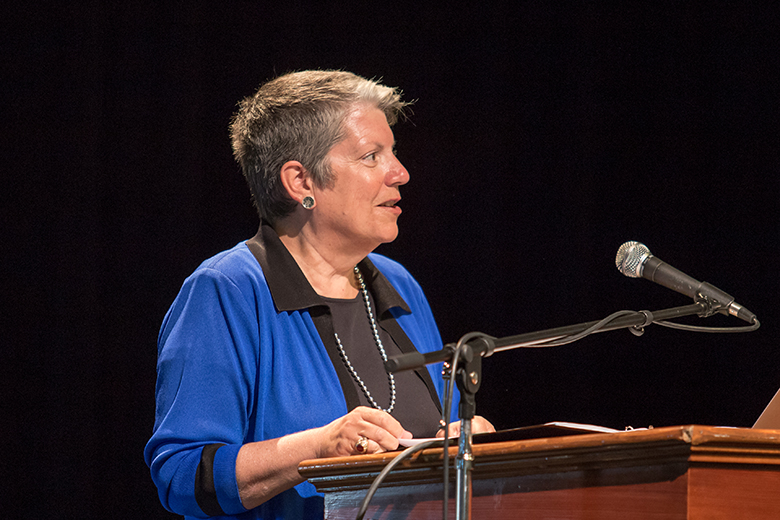
Each afternoon during the Dickens Universe, a 4:00 PM “talk” is presented in the Porter Dining Hall. On Monday, August 1st, Elisha Cohn of Cornell University focused on Diogenes in her talk “What the Dog Said: Inhuman Voices in Dombey and Son.” She was preceded by a special guest: UC President Janet Napolitano, accompanied by UCSC Chancellor George Blumenthal, visited the Universe, making it one of just a handful of campus visits as she passed through Santa Cruz. She was introduced by Director John Jordan, who gave a short history of the Dickens Project, saying, “We owe our existence to the Office of the President.” When multi-campus research projects were proposed at UC, the Dickens Project was one of very few that were granted for the humanities; most were in the sciences. President Napolitano was carrying her own copy of Dombey and Son, and she surprised and delighted attendees by giving them her own brief take on the novel.
(To read the complete summary of the 2016 Dickens Universe conferece by Beth Penney, please click here.)
Thank you, Dr. Jordan, and thank you all for that warm welcome.
As a fan of Dickens, I am honored to join you today at the 36th annual Dickens Universe.
And as the President of the University of California, I am proud that both Dickens Universe, and the Dickens Project, have called UC Santa Cruz home since their inception.
Now, I know that you walked to the Porter Dining Hall in order to hear Elisha Cohn give her talk this afternoon.
(By the way, I’m pleased to share that Dr. Cohn is a UC Berkeley graduate).
Given the talk title, I’m hopeful that Dr. Cohn’s address will include a discussion of the most frightening and most aggressively fearsome character in all of Dombey and Son:
Diogenes.
(How many of you thought I was going to say Mr. Carker? That’s what I thought.)
But before I turn the podium over to Dr. Cohn and the novel’s inhuman voices, I’d like to say a few words about why phenomena like Dickens Universe are so important to public research universities like the University of California.
Towards the last couple hundred pages of Dombey, there is a scene that depicts the Dombey House employee Mr. Morfin visiting Harriet and John Carker in their humble home.
Mr. Morfin is describing to Harriet and John what happened to him after he overheard the Carker brothers discuss their shared history one day at the House.
In the course of hearing the brothers talk, Mr. Morfin explains, he learned about John’s past, and the “relative positions” of the brothers in the House for the first time.
Mr. Morfin says that this new knowledge, and I quote, “shook me in my habit—the habit of nine-tenths of the world—of believing that all was right about me because I was used to it.”
Mr. Morfin continued, and said, quote:
“I think it was almost the first time in my life when I fell into this train of reflection—how will many things that are familiar, and quite matters of course to us now, look when we come to see them from that new and distant point of view which we must all take up, one day or other?”
End-quote.
Mr. Morfin’s eloquent reflection is a poignant analogy for the importance of the humanities, and one of the best that I have encountered.
The process he describes—of looking at familiar people and places through new and distant points of view, and of being shaken in our habits—is the process we each experience when we read a transformative novel, when we see a timeless painting, or when we listen to a powerful symphony.
It’s the process that, fundamentally, makes us human.
At the University of California, the humanities are a cornerstone of our world-renowned research and education missions. Both the study and the instruction of the humanities ensure the transmission of our cultural heritage from one generation to the next; broaden our understanding of the human experience; and foster our intellectual curiosity and our empathy as members of a diverse and democratic society.
The Dickens Universe—and the Dickens Project—play an important role in this mission. It’s not just professors who attend this conference, for example; it’s also members of the public. It’s not just graduate students who participate in the seminars; it’s also community college students, and even high school students.
These are just a few of the reasons why, when I announced the new University of California Presidential Endowed Chairs last year, I was thrilled to see that one of the first chairs established was the Jordan-Stern Presidential Chair for Dickens and Nineteenth-Century Studies right here at UC Santa Cruz.
(And I want to be clear that I fully intended to be here in person last summer to commemorate this new chair…until I learned that the assigned novel was Martin Chuzzlewit.)
On that note—and in the spirit of the last bottle of the old Madeira, standing open in celebration on Mr. Gills’s table—I will bring my remarks to a close.
It has been my privilege to speak to you this afternoon. I hope you enjoy the rest of Dickens Universe.
And in the words of the motto of the University of California, “Fiat Lux”—or, “Let There Be Light.”
